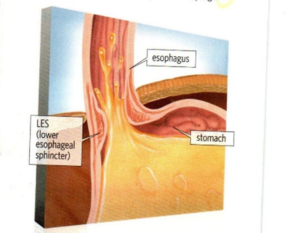To Better Health
By Picking up this brochure, you’ve taken a step toward better health. Keep reading to learn Smart choices and simple steps you can make to help put your health first.
Whether you’re just diagnosed or already being treated for acid reflex disease, this guide will give you tools to:
- Talk to your doctor.
- Stick to your treatment plan.
- Make simple changes that can make a big difference in how you’re feeling.
Open Up. Be honest about how you feel and how you symptoms affect your life. What you say will help shape your treatment plan.
- Do you take antacids more than two times a week?
- How many days a week do you have symptoms?
- Does it hurt to swallow?
- Does heartburn wake you up at night?
- Does discomfort keep you from enjoying certain foods, drinks or activities?
! Share these answers at each visit. What you say could be the key to knowing whether your treatment needs to be adjusted.
Symptoms of Acid Reflux Disease
The following are telltale signs of acid reflux disease:
- Heartburn – a painful burning in your chest or mid-stomach
- Chest pain – especially when lying down or at night
- Hoarseness or sore throat
- Bitter or acid taste in your mouth
- Burning in the back of your throat
- Trouble swallowing or feeling like food is getting stuck
- Frequent burping
If any of these sound familiar-especially if they happen more than three times a week or get worse after meals-you may have acid reflux disease, also called GRED (gastro-esophageal reflux disease).
Risk Factors
These conditions or behaviors can increase your risk of acid reflux disease or trigger symptoms:
- Being overweight
- Drinking alcohol
- Stress
- Pregnancy
- Hiatal hernia- when your stomach pushes up into your chest
- Medicines- including aspirin and ibuprofen
Discuss your symptoms
For each symptom you have, ask yourself:
When did it start?
When does it happen?
How long does it last?
Share your answers with your doctor today.
Acid Reflux Disease
When you have acid reflux disease, your LES9lower esophageal sphincter) opens when it shouldn’t and acid from your stomach washes back up into your esophagus-or even into your throat or mouth.
How it Works
- The muscular LES opens when it shouldn’t.
- Stomach acid washes back up into the esophagus.

Over time, the constant backwash of stomach acid can irritate and damage your esophagus. If this happens, you might have complications, like the nine explained at
TREATMENT
FOR Acid Reflux Disease
If you have acid reflux disease, the goal of treatment is to:
- Get relief from symptoms
- Prevent damage to your esophagus
- Reduce your risk of serious complications
To do this, you and your doctor will work together to develop a treatment plan. This plan will probably include one or more of the following medicines:
- Antacids- these lessen the effects of stomach acid. They may be the first treatment you try, along with changes to your diet

Popping Antacids?
Remember, antacids will only help reduce symptoms once they start. They don’t prevent damage to your esophagus. If you are taking antacids two or more times a weeks, your doctor may recommend another treatment.
TREATMENT
FOR Acid Reflux Disease
- H2 blockers- These limit the amount of acid your stomach makes. They give you longer relief than antacids, but they don’t act as quickly. They can also help your esophagus heal if it isn’t too damaged.
- Proton pump inhibitors (PPls) – These block the production of acid in your stomach and help heal the esophagus. If you take them correctly, they can keep symptoms from coming back.
Medicine
- Fill & Refill your prescription
Think you don’t need medicine? Having side effects? Tell your doctor so he can find a solution.
- Take Every Dose
Medicine can be easy to forget.
- Put a note where you’ll be sure to see it every day or schedule a reminder through your phone or computer’s calendar program
“ Only 50% of patients take their medicine correctly. “
To improve your symptoms, replace old habits with new and health ones. How? Start by changing just one thing. *
Say “no” to
Your triggers.
Certain foods and drinks can trigger symptoms by making your LES relax when it shouldn’t, increasing the amount of pressure or acid in your stomach, or irritating your esophagus.
Skip large meals & evening eating.
Eating a large meal puts pressure on your LES. And eating too close to bedtime increases the chance of acid backing up into your esophagus when you lie down.
*Try making lunch your main meal and eat a light dinner, at least two hours before bedtime. And skip late-night snacks.
Smart Choices.
Stop smoking.
Smoking keeps your LES from working properly. Also, tobacco may cause your stomach to make more acid.
Lose extra weight
Extra weight puts pressure on your stomach and pushes acid back up into your esophagus.
*Keep tempting, unhealthy foods out of the house. You less likely to eat them if you don’t have them nearby.
Reduce anxiety and stress
Stress and anxiety can lead to bad habits like smoking, late-night snacking and over-eating, all of which make heartburn worse.
*Start with 10 minutes of deep breathing a day.
